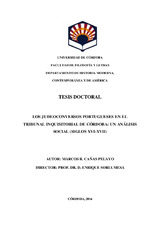Los judeoconversos portugueses en el Tribunal Inquisitorial de Córdoba: un análisis social (ss. XVI-XVII)
Autor
Cañas Pelayo, Marcos Rafael
Director/es
Soria Mesa, EnriqueEditor
Universidad de Córdoba, UCOPressFecha
2016Materia
InquisiciónJudeoconversos
Portugueses
Tribunal Inquisitorial
Córdoba (España)
Edad Moderna
Siglo XVI
Siglo XVII
METS:
Mostrar el registro METSPREMIS:
Mostrar el registro PREMISMetadatos
Mostrar el registro completo del ítemResumen
El principal objetivo de esta tesis doctoral es analizar al grupo judeoconverso
portugués en el Tribunal Inquisitorial de Córdoba durante los siglos XVI y XVII.
Nuestro propósito es estudiar a los miembros de este colectivo desde diferentes ópticas,
no solamente a raíz de la persecución que algunos de ellos sufrieron ante la temida
institución. Así, junto con los procesos inquisitoriales, se aborda su realidad
socioeconómica. Metodológicamente, este estudio realiza en primer lugar una revisión
bibliográfica sobre la cuestión, poniendo especial hincapié en los avances
historiográficos acontecidos durante los últimos años. Seguidamente, a través de
diferentes fuentes archivísticas, con un peso muy destacado de los protocolos notariales,
se profundiza en la actividad de los cristianos nuevos lusitanos asentados en el distrito.
Para algunos de los linajes más destacados, hemos podido brindar reconstrucciones
genealógicas que permiten comprender mejor sus estrategias matrimoniales, avatares,
trances inquisitoriales y, pese a todo, un notable ascenso social. Las presentes páginas
pretenden profundizar en los mecanismos que los integrantes de esta minoría llevaron a
cabo para integrarse en el resto de la sociedad, a la par que los rasgos propios que les
caracterizaron y diferenciaron. Unas primeras interpretaciones sobre este sujeto social
que son acompañadas de distintas bases estadísticas para valorar la importancia de esta
emigración en el área de estudio. The main objective of this thesis is to analyze the converted Jew Portuguese
group within the Inquisition Tribunal of Córdoba during the 16th and 17th centuries.
Our purpose is to study the members of this group from different prisms; not just based
on the prosecution which some of them were subjected to by the feared institution.
Thus, their social-economic reality will be tackled alongside with the inquisitorial
procedures. Regarding methodology, on a first stage this study carries out a
bibliographical revision about the subject, paying special attention to the
historiographical advancements that have been achieved in recent years. Then,
throughout different archive sources, and with a bigger impact highlighting the notary
protocols, we delve into the economic activity of the new Lusitanian Christians settled
in the district. For some of the more prominent lineages, we have been able to approach
genealogical reconstructions which allow us to understand better their marriage
strategies, struggles, inquisitorial trances, and despite all of this, a remarkable social
ascension. The present pages intend to delve deeper into the mechanisms that the
members of this minority carried out to integrate themselves within the rest of the society, as well as into the individual features and traits that defined and differentiated
them. Several early interpretations about this social subject will be presented,
accompanied by various statistic bases to value the impact that this immigration had on
the subject of study.

